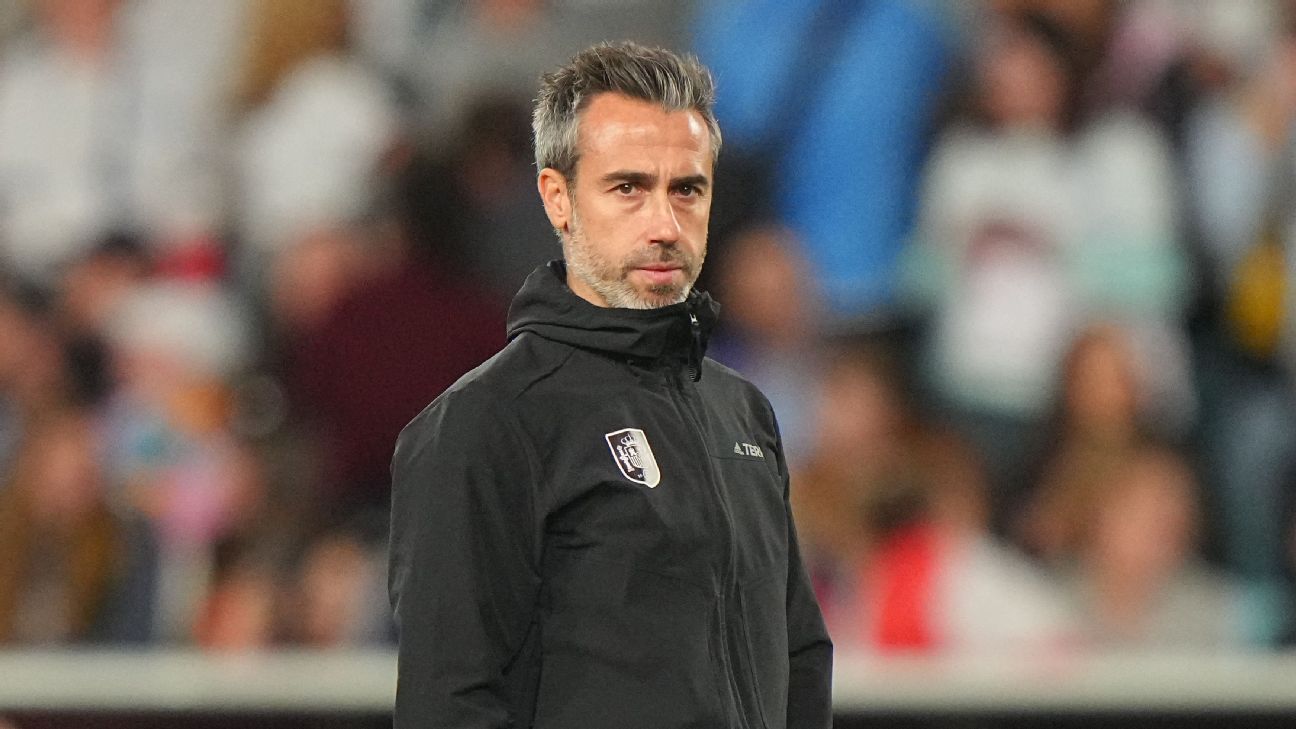Vilda fired as Spain coach amid Rubiales fallout

Spain‘s Women’s World Cup-winning coach Jorge Vilda was fired Tuesday by the Royal Spanish Football Federation (RFEF) as the fallout from Luis Rubiales’ behaviour continues.
With Rubiales suspended as Spanish FA president for 90 days by FIFA following his unsolicited kiss on forward Jenni Hermoso, the committee of regional presidents in charge of the RFEF, led by Pedro Rocha, informed Vilda of the decision to fire him. Rocha is set to meet with Spain’s National Sports Council (CSD) president Victor Francos later Tuesday.
– Charting Spain FA president’s five controversial years in charge
Vilda was informed of the decision Tuesday, shortly after the RFEF issued a statement apologising for “totally unacceptable behavior” by Rubiales and saying that it is cooperating with disciplinary action against him.
“The RFEF wants to convey to the whole of society and to the whole of world football its deepest regret for what has happened, which has tarnished our national team, our football and our society,” the statement reads. “The damage caused to Spanish football, to Spanish sport, to Spanish society and to the values of football and sport as a whole has been enormous.”
The RFEF thanked Vilda in their statement Tuesday and said: “The coach has been key to the notable growth in women’s football and left Spain as World Champion and second in FIFA ranking.”
The graphic the RFEF posted on social media said: “Gracias Jorge.”
The RFEF also promised a “profound and immediate restructuring” of the organisation following Rubiales’ conduct.
That conduct led all 23 members of Spain’s victorious World Cup squad to co-sign a statement last month — joined by 58 other current and former players — saying they would not return to play for the national team again “if the current management continues.”
Joan Soteras, the president of the Catalan Federation and a member of the RFEF committee of regional presidents, foreshadowed the sacking last week.
“There have to be structural changes in women’s football,” he said. “One of those could be [removing] Vilda. He was at the centre of the mess with the national team [last September]. If it was up to me, I would [dismiss him]. A change would be the most convenient thing for the good of women’s football.”
Vilda, 42, had held the role since 2015 and, despite having never previously won a knockout game at a major tournament before this year, was in charge as Spain won the World Cup by beating England 1-0 in the final in Sydney.
That victory has been largely overshadowed by Rubiales’ actions. Along with the FIFA suspension, the Spanish FA have called for his resignation and prosecutors have opened a preliminary sexual assault probe into the incident.
Rubiales said the kiss was with consent, but Hermoso refuted that claim and said in a statement last month she felt “the victim of aggression.”
Vilda has been strongly backed by Rubiales — even when 15 players complained about the management structure last September — and initially maintained his silence over his behaviour.
When Rubiales announced he would not step down, the suspended president even offered Vilda a new four-year contract worth €500,000 a year.
However, after four assistant coaches for Spain’s senior team, two coaches of the women’s youth teams and five other staff members for the senior and youth women’s teams resigned last month, Vilda released a statement criticising Rubiales’ “improper behaviour.”
Despite that, the belated nature of his comment, the fact he applauded Rubiales’ speech and his role in last September’s crisis with Spain’s women’s team has led to his dismissal.
Vilda, who spent time at Barcelona, Rayo Vallecano‘s and Real Madrid‘s academies as a player, joined the RFEF in 2009 as the assistant coach to his father, Angel, with the under-19 women’s team.
He went on to coach the U17s and the U19s before taking the senior side on in 2015 when previous coach Ignacio Quereda resigned after the players had called for his dismissal.
Under Vilda, Spain failed to win a knockout game at Euro 2017, the 2019 World Cup and Euro 2022, suffering defeats to Austria, the United States and England respectively.
That led to the players pushing for change at the RFEF behind the scenes. They wanted the federation to make significant improvements to travel, preparation and the backroom staff, and also complained about elements of Vilda’s management style on and off the pitch.
After being ignored by the RFEF and denying the accusation they were attempting to blackmail the federation into sacking Vilda, 15 players announced last September they would no longer play for the national team until there were significant changes.
Prior to the World Cup, three of the 15 returned, another five were willing to but were not called up, and seven continued to make themselves unavailable.
During the tournament, Vilda refused to speak about the fractures among the squad, instead preferring to focus on the 23 players he took with him to Australia and New Zealand and events on the pitch.
